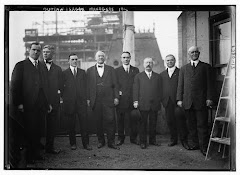 Reviewer: Elle Ewok
Reviewer: Elle EwokRating: 4 Pierogies
Review: I recently realized that I have a huge gaping hole in my formal and informal literary education. I have virutally no exposure to American writers from the South, particulary those associated with the Southern Gothic literary style including William Faulkner, Flannery O'Connor, Thomas Wolfe, Tennessee Williams etc.
On a recent trip to New Orleans I endeavored to remedy this deficiency and I stopped by Faulkner House Books and asked the woman who worked there (who is an expert in all things Faulkner) which of his books I should read first. She handed my a copy of As I Lay Dying with a big smile. This choice was not a suprising one, As I Lay Dying is considered Faulkner's most accessible novel and is the usually recommended as the best starting point for new readers to Faulker's body of work.
I confess to being extremely frustrated with the beginning several chapters of As I Lay Dying. The rural dialect was difficult to understand. Additionally, the stream of conscious narrative was confusing. Each chapter is narrated from the point of view of a different character. The character narrarating the chapter would refer to "him" "her" or "it" and you had no idea who or what was being referenced since stream of conscious writing necessarily eliminates exposition. My frustration lifted after several chapters though and I began to enjoy the book immensely. The rural dialect seemed more accessible and the people and objects who were unidentified in previous chapters eventually become known in later chapters.
This is not a book where you can put your brain on autopilot and enjoy the ride - it requires what I call "active reading" - Faulkner forces you to put the pieces together and you have to pay attention to understand the narrative. However, when you eventually figure that issue or event that was confused and unclear eariler in the novel it is extremely satisfying - like finishing a sukodu puzzle or eating nachos.
 There has been much discussion and scholarship about the themes of As I Lay Dying: subjective truth vs. objective truth, social definitions of normalcy, personal isolation, limitations and pride associated with poverty, and the ugly nature of physical processes. However, it is not the novel's themes or social commentary that have stayed with me since I finished this book. Stripped away of all themes, symbols and motifs, this book at its core, in my opinion, is a very dark comedy - and I like dark comedies.
There has been much discussion and scholarship about the themes of As I Lay Dying: subjective truth vs. objective truth, social definitions of normalcy, personal isolation, limitations and pride associated with poverty, and the ugly nature of physical processes. However, it is not the novel's themes or social commentary that have stayed with me since I finished this book. Stripped away of all themes, symbols and motifs, this book at its core, in my opinion, is a very dark comedy - and I like dark comedies.The basic plot line revolves around a family of ignorant rural hillbillies who are taking the decomposing corpse of the family matriarch to a town 30 miles away for burial. What makes it really dark is that it takes them several days to get started so that the body is badly decomposing and reeking throughout the ardous journey under the hot Mississippi sun. Their wagon is followed by buzzards and they bring disgust and inconvenience upon every person or town unfortunate enough to cross their path. None of the characters are particularly sympathetic either, for although they claim to be transporting the body out of respect for the dead woman's wishes in reality they all have their own selfish motivations for the trip whether it be to obtain false teeth or an abortion. That said, there are several characters that I did find myself warming up to and kept me emotional invested in the story; Darl and Cash in particular.
In the end it was the clever writing (one which offered reward after challenging readers) and the deliciously evil and darkly comical plot line that won me over. I look forward to reading more of Faulkner's work.

No comments:
Post a Comment